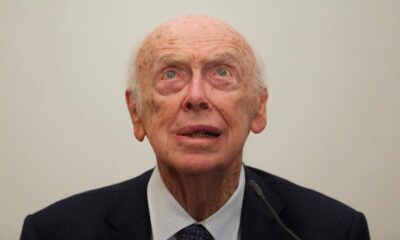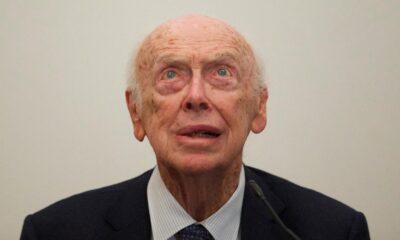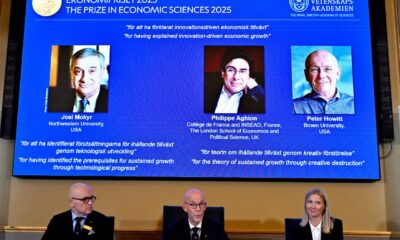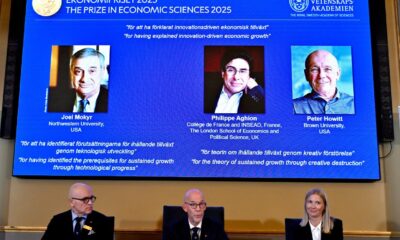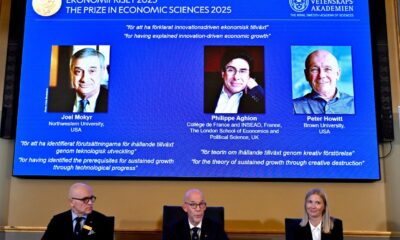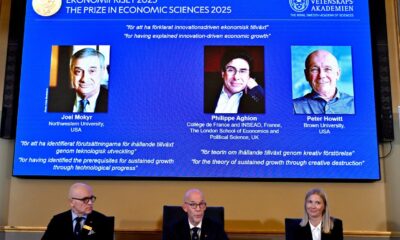Science
Economists Celebrate Nobel Prize for Insights on Innovation
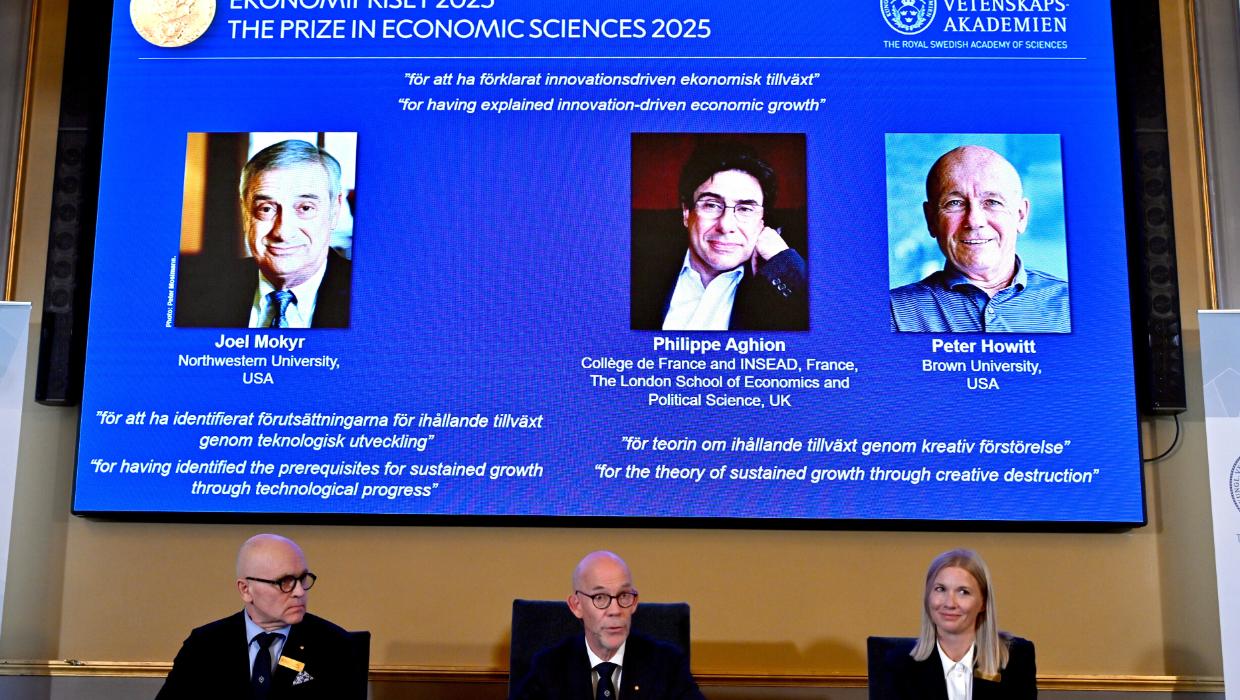
Three economists have been awarded the Nobel memorial prize in economics for their groundbreaking research on business innovation and its role in economic growth. The winners, Dutch-born Joel Mokyr of Northwestern University, Philippe Aghion from the Collège de France and the London School of Economics, and Canadian-born Peter Howitt of Brown University, were recognized for their contributions to understanding “creative destruction”—a vital economic process that drives innovation and replaces outdated technologies.
Their work sheds light on how new products and inventions not only foster economic growth but also enhance human welfare, despite often leaving older companies behind. This concept, associated with economist Joseph Schumpeter, was termed “the essential fact about capitalism” in his 1942 book, “Capitalism, Socialism and Democracy.” The Nobel committee praised Mokyr for showing that for innovations to thrive in a self-generating process, scientific explanations for their success are essential.
Understanding Creative Destruction
The research of Aghion and Howitt introduced a sophisticated mathematical model for creative destruction, expanding previous theories. Their findings illustrate that markets dominated by a few large companies can stifle innovation, as observed in sectors like telecommunications and social media.
John Hassler, chair of the Nobel committee, emphasized the importance of maintaining the mechanisms that underpin creative destruction to prevent economic stagnation. He stated, “The laureates’ work shows that economic growth cannot be taken for granted.” Aghion and Howitt argue for supporting those affected by innovation, advocating for social mobility to ensure individuals are not confined to the professional paths of their parents.
Mokyr has consistently expressed optimism regarding technological advancements. He acknowledges that while innovations can lead to short-term job losses, they also create new opportunities. He refuted the notion that modern inventions, like smartphones and the internet, lack significant economic impact compared to earlier innovations such as the airplane.
The Future of Innovation and AI
The urgency of fostering innovation is particularly relevant in Europe, where a report by former European Central Bank head Mario Draghi highlighted a growing productivity gap with the United States in digital technology. Aghion stressed the need for Europe to enhance research and venture capital investment to keep pace with the U.S. and China, stating, “We have to wake up. Because you know who will win in this competition? Those who innovate.”
Aghion also addressed the potential of artificial intelligence (AI) to drive economic growth, contingent on supportive institutions and policies. He warned that established players in the sector could inhibit competition, which may deter new entries. Mokyr dismissed dystopian views of AI, framing it as a valuable research tool that enhances human work rather than replaces it.
Both Mokyr and Howitt shared their surprise at being awarded the Nobel Prize. Mokyr recalled waking up early to find congratulatory messages on his laptop, initially confusing him. “I think I sat there for 15 minutes, sort of dazed,” he remarked. Howitt received a call from a Swedish journalist, initially suspecting it was a prank.
The prize, valued at 11 million Swedish kronor (approximately $2.02 million), will be split between Mokyr and the duo of Aghion and Howitt. Each laureate will also receive an 18-carat gold medal and a diploma. The Nobel Prize in Economic Sciences, established in 1968 by the Bank of Sweden, is awarded alongside the traditional Nobel Prizes.
In conclusion, the recognition of these three economists highlights the ongoing importance of innovation in economic development, a factor that remains critical as the world navigates the complexities of technological advancements and shifting market dynamics.
-

 World6 days ago
World6 days agoPrivate Funeral Held for Dean Field and His Three Children
-

 Top Stories1 week ago
Top Stories1 week agoFuneral Planned for Field Siblings After Tragic House Fire
-

 Sports3 months ago
Sports3 months agoNetball New Zealand Stands Down Dame Noeline Taurua for Series
-

 Entertainment3 months ago
Entertainment3 months agoTributes Pour In for Lachlan Rofe, Reality Star, Dead at 47
-

 Entertainment2 months ago
Entertainment2 months agoNew ‘Maverick’ Chaser Joins Beat the Chasers Season Finale
-

 Sports3 months ago
Sports3 months agoSilver Ferns Legend Laura Langman Criticizes Team’s Attitude
-

 Sports4 weeks ago
Sports4 weeks agoEli Katoa Rushed to Hospital After Sideline Incident During Match
-

 Politics2 months ago
Politics2 months agoNetball NZ Calls for Respect Amid Dame Taurua’s Standoff
-

 World2 weeks ago
World2 weeks agoInvestigation Underway in Tragic Sanson House Fire Involving Family
-

 Entertainment3 months ago
Entertainment3 months agoKhloe Kardashian Embraces Innovative Stem Cell Therapy in Mexico
-

 Sports4 weeks ago
Sports4 weeks agoJamie Melham Triumphs Over Husband Ben in Melbourne Cup Victory
-

 World4 months ago
World4 months agoPolice Arrest Multiple Individuals During Funeral for Zain Taikato-Fox

